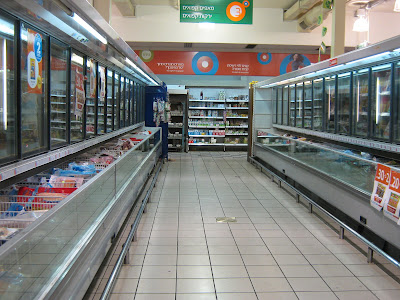I don't consider this a food blog of any sort, but as I do enjoy baking and cooking, I suppose a post on food every now and then is not out of order. Specifically, I have about two recipes that I make repeatedly, and therefore, I have about two recipes that are requested repeatedly. Since it was just Shabbat, I'll start with the traditional bread for Erev Shabbat (Friday after sunset): Challah.
After my first year in Israel, I decided that I needed to find a good recipe for Challah because, lets be honest, there aren't too many Jewish Bakeries in Montana. If I wanted good Challah, I would have to make it myself. So I did an internet search which netted me various and sundry results. The one I finally decided to try can be found
here. It turned out so well that I made it every Friday at camp.
 |
| This is a small sample of the amount of bread baked at camp. |
At this point I should probably offer a disclaimer: I am not Jewish, my camp is not Jewish, and I mostly like the bread for its taste. Still, although I don't come even close to keeping Shabbat, I do enjoy some of the tradition associated with it: the candles, the blessings, the community. I suppose the specifics vary from family to family, but some elements remain the same. Here, we will make a fairly simple meal, invite over a few friends (since none of us really have family in the area), say a brief liturgy over the candles, bread, and wine, and then spend the evening enjoying each other's company.
Anyway, here is the Challah recipe I use (from the website but cut in half because 3 loaves is plenty).
Mix together:
7 c. flour (I use white, but probably could use about half wheat)
1 c. sugar (less can be put in if you, but probably not more)
1 Tbsp. salt
2 Tbsp. yeast (active, dry)
Make a well in the flour and pour in:
2 c. warm water (less than 115F)
1/3 c. oil (I often use olive oil, though the bread doesn't seem to rise as well)
1 egg
Mix together wet and dry ingredients. (If you want, you can add the yeast to the water first to let it soften. I don't generally see much of a difference.) Kneed the dough until smooth and stretchy. Cover it and let it rise until roughly doubled in size. Ideally, this should take about an hour but may vary, depending on ambient temperature.
Once the dough has risen, allow it to deflate and begin dividing it to shape it into loaves. I generally make three braided loaves from it which requires nine roughly equal portions of dough. Roll each portion of dough into a "snake," probably about a foot long. Take three dough snakes and pinch them together at one end. Braid. Seal off the other end. (If you don't know how to braid...uh...find someone who does.)
Place the braided loaves on a greased sheet pan...or 2 sheet pans...or, if you want, in a loaf pan. Let rise again, until about doubled.
Meanwhile, beat one egg. When the loaves have risen, gently brush the egg onto the loaves, covering them. Then sprinkle the loaves with sesame seeds.
Put in a preheated oven (roughly 375F or 190C) and bake for 20-30 minutes or until a dark golden brown.
While the bread is baking, prepare the glaze.
Glaze:
3/4 c. boiling water
1/2 c. sugar
I usually roughly estimate water and sugar amounts and throw them in the microwave until the syrup boils. Have this ready just as the bread comes out of the oven.
Take the bread out of the oven and immediately pour the glaze over the top of the loaves, trying to hit every spot. Drain off the excess glaze and remove the loaves to a wire cooling rack. (If you leave them in the excess syrup too long they will get soggy.) You're done!
 |
Here are some friends helping me make Challah for
this last Shabbat. |
Before you eat the bread, say this blessing:
Ba-ruch at-ta Adonai Elohenu me-lek ha-o-lam ha-mo-tzee le-chem min ha-a-retz.
Blessed is the Lord our God, Ruler of the Universe, who causes bread to come forth from the earth.
Shabbat Shalom!


























